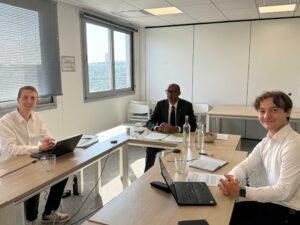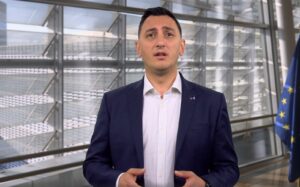On the 13th of June, EASE held its 2025 General Assembly in a spirit of unity and institutional dialogue, marking a pivotal moment for the organisation as it looks ahead to its next cycle of strategic development.
This year’s edition was elective, resulting the unanimous election of a new Board to serve until 2027. We are pleased to announce:
-
Philippe Diallo was re-elected as President, reaffirming his commitment to defending and promoting the interests of sport employers in Europe.
-
Johan Rydstedt was elected as Secretary General, stabilising the position and confirming the Swedish involvement of our office.
-
Petri Heikkinen continues in his role as Treasurer, ensuring the association’s financial soundness and Finnish engagement.
This newly elected Board, while composed of experienced members, also echoed internal discussions about the importance of further diversifying EASE’s governance, particularly in line with our BeST Inclusion project and its commitment to gender equity in leadership.
Beyond its statutory dimension, the General Assembly served as valuable platform for exchange with representatives of major European institutions, reaffirming the association’s role as a key stakeholder in sharing sport policy across the continent.

We were honoured to begin our institutional session with a video message from Glenn Micallef, Maltese Commissioner-designate for Intergenerational Fairness, Youth, Culture and Sport in the second von der Leyen Commission. His contribution highlighted the importance of placing sport at the heart of European values, not only as a tool for physical and mental well-being, but also as a driver of social cohesion and youth impowerment. He also had the opportunity to recognise the work carried out by EASE to promote a healthy, sustainable European sport model aimed at unity in diversity, in particular by paying tribute to the ESCSE and BeST Inclusion projects. Commissioner Micallef underlined the need for stronger links between employers, sport structures and EU policymaking, especially in the face of new challenges such as digitalisation and sustainability.

We were equally honoured to welcome Nikola Minchev, Member of the European Parliament from Bulgaria, who presented the key elements of the upcoming report on the European sport model. His speech drew attention to a wide range of structural issues affecting sport in Europe—from the decline in volunteerism and the pressures on grassroots funding to the risks posed by unregulated private capital and secondary ticket markets.
Mr. Minchev called for a firm reaffirmation of the pyramid structure of sport and the principle of open competitions, underlining how initiatives such as the Super League threaten the foundations of European sport. He also advocated for clearer rules regarding the ownership of clubs, the role of agents and intermediaries, and athlete protection, including the right of athletes to represent their national teams and benefit from adequate rest periods. These priorities reflect a strong political will to regulate sport in a way that balances economic sustainability with social and cultural values.
The Assembly concluded its institutional segment with a presentation by Sophie Kwasny, Head of the Sport Division at the Council of Europe, who reminded participants of the broader geographical and legal framework in which sport policies operate. The Council of Europe, with its 46 member states, serves as a unique intergovernmental platform for promoting human rights, democracy, and the rule of law in sport.
Ms. Kwasny presented the Council’s main sport-related conventions, including the Anti-Doping Convention, the Macolin Convention on match-fixing, and the Saint-Denis Convention on safety and security at sports events. She introduced EPAS (the Enlarged Partial Agreement on Sport) as a crucial structure for cooperation among governments, and discussed the relevance of the Revised European Sports Charter, particularly Article 5, which relates to values-based governance. While the European sport model is explicitly mentioned only in Article 2, she noted that its spirit runs through the entire document and underpins the Council’s actions.
In his closing remarks, President Philippe Diallo emphasised EASE’s unique role in bridging the institutional and operational dimensions of sport in Europe. EASE emerges from this General Assembly with renewed legitimacy, strengthened institutional connections, and a clear roadmap for the future—one that embraces solidarity, dialogue, and shared European values.